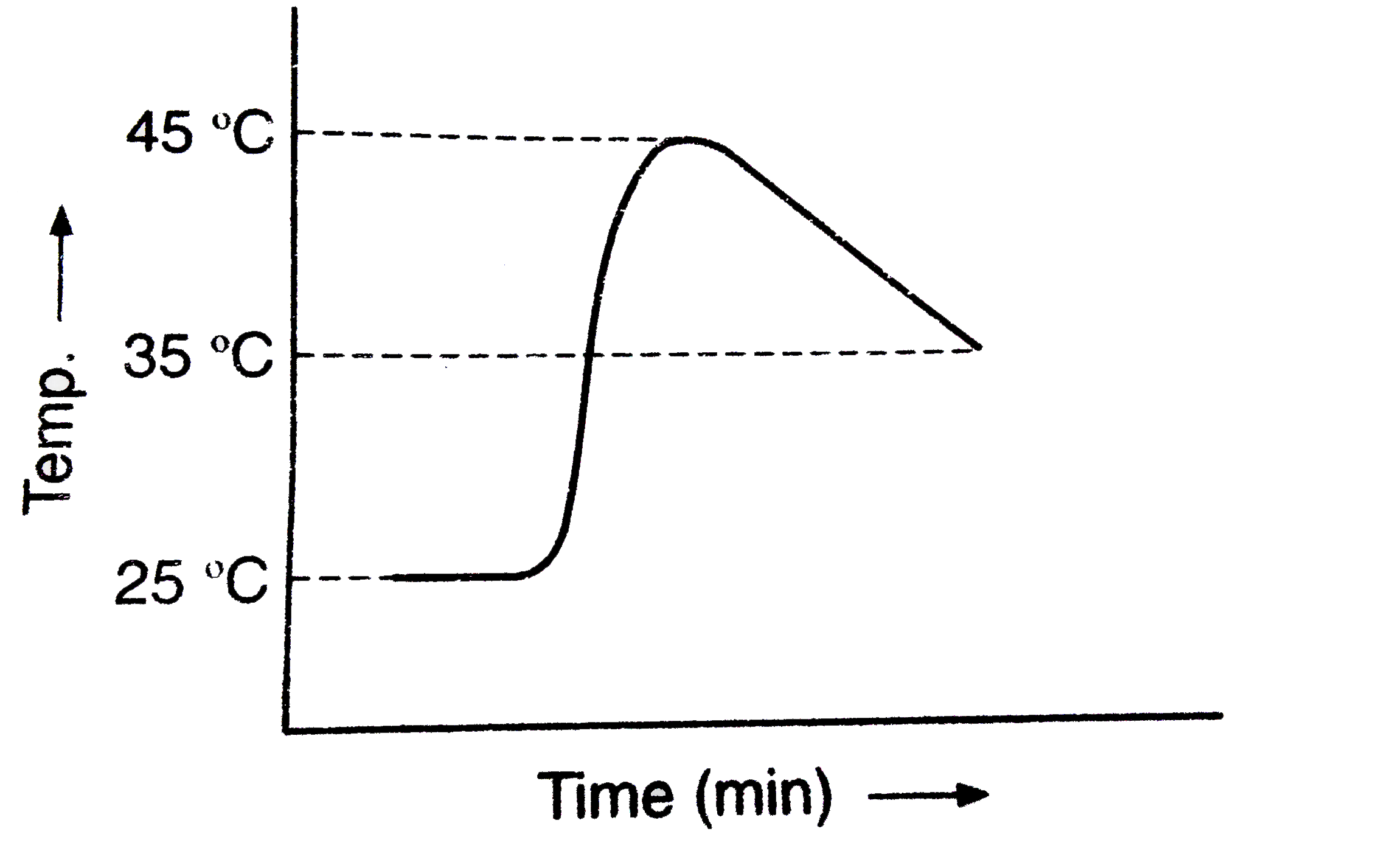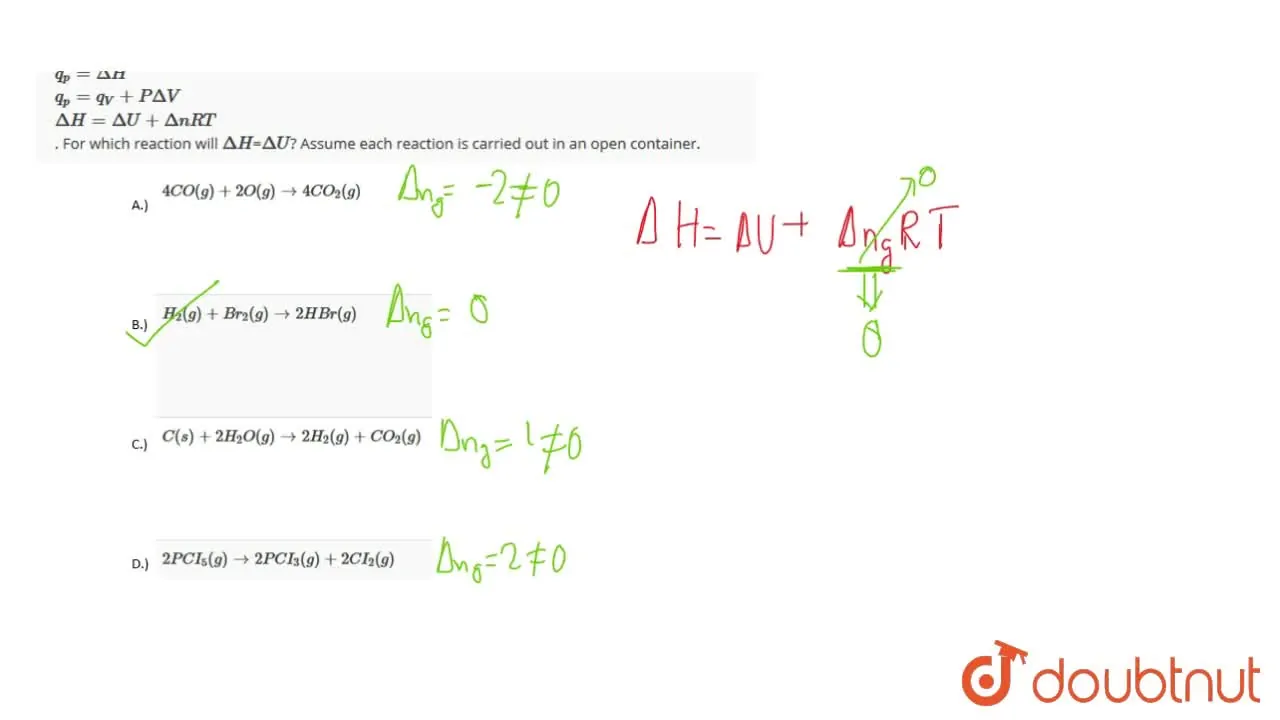Chemical reactions are invariably associated with the transfter of energy either in the form of heat or light. In the laboratory, heat changes in physical and chemical processes are measured with an instrument called calorimeter. Heat change in the process is calculated as
{:(q = ms DeltaT,,s =Specific heat),(=cDeltaT,,c =Heat capacity):}<br>Heatofreactionatconstantvolumeismeasuredusingbombcalorimeter.<br>q_(V) = DeltaU =Internale≠rgychan≥<br>Heatofreactionatconstantpressureismeasuredusingsimp≤orwatercalorimeter.<br>q_(p) = DeltaH<br>q_(p) = q_(V) +P DeltaV<br>DeltaH = DeltaU +DeltanRT<br>ForwhichreactionwillDeltaH = DeltaU? Assume each reaction is carried out in an open container.
4CO(g)+2O(g)→4CO2(g)
H2(g)+Br2(g)→2HBr(g)
C(s)+2H2O(g)→2H2(g)+CO2(g)
2PCI5(g)→2PCI3(g)+2CI2(g)
ΔU=nCVdT
moles (n)=0.1g16=6.25×10−3
CV=500JK−1
T=273+2=275K
∴ΔU=−160kJ
Related Playlists
- BOOK - CENGAGE CHEMISTRYCHAPTER - THERMODYNAMICSEXERCISE - Exercises (Multiple Correct)50videos
THERMODYNAMICS
- BOOK - CENGAGE CHEMISTRYCHAPTER - THERMODYNAMICSEXERCISE - Exercises (Single Correct)62videos
THERMODYNAMICS
- BOOK - CENGAGE CHEMISTRYCHAPTER - THERMODYNAMICSEXERCISE - Exercises (Subjective)70videos
THERMODYNAMICS
- BOOK - CENGAGE CHEMISTRYCHAPTER - STOICHIOMETRYEXERCISE - Archives Subjective33videos
STOICHIOMETRY
Similar Questions
Chemical reactions are invariably associated with the transfter of energy either in the form of heat or light. In the laboratory, heat changes in physical and chemical processes are measured with an instrument called calorimeter. Heat change in the process is calculated as
q=msΔTs=Specific heat=cΔTc=Heat capacity
Heat of reaction at constant volume is measured using bomb calorimeter.
qV=ΔU= Internal energy change
Heat of reaction at constant pressure is measured using simple or water calorimeter.
qp=ΔH
qp=qV+PΔV
ΔH=ΔU+ΔnRT
The heat capacity of a bomb calorimeter is 500JK−1. When 0.1g of methane was burnt in this calorimeter, the temperature rose by 2∘C. The value of ΔU per mole will beView SolutionChemical reactions are invariably associated with the transfter of energy either in the form of heat or light. In the laboratory, heat changes in physical and chemical processes are measured with an instrument called calorimeter. Heat change in the process is calculated as
q=msΔTs=Specific heat=cΔTc=Heat capacity
Heat of reaction at constant volume is measured using bomb calorimeter.
qV=ΔU= Internal energy change
Heat of reaction at constant pressure is measured using simple or water calorimeter.
qp=ΔH
qp=qV+PΔV
ΔH=ΔU+ΔnRT
The enthalpy of fusion of ice is 6.02kJmol−1. The heat capacity of water is 4.18Jg−1C−1. What is the smallest number of ice cubes at 0∘C, each containing one molw of water, the are needed to cool 500g of liquid water from 20∘C→0∘C?View SolutionHeat of reaction at constant volume is measured in the apparatus
View SolutionChemical reactions are invariable associated with the transfer of enery either in the form of heat or light. In the laboratory, heat energy I physical and chemical processes are measured with an instrument called caloriemter. Heat change in the process is calcualted as:
q−msΔT, s=specific heat
=cΔT, c= Heat capacity.
Heat of reaction at constant pressure is measured using bomb calorimeter.
qV=ΔU= Internal energy change
heat of reaction at constant pressure is measrued using simple or water calorimeter.
qP=ΔH
qP=qV+PΔV
ΔH=ΔU+ΔnRT
The amount of energy released during a chemical change depends on the physical state of reactants and products, te conditions of pressure, temperatrue and volume at which the reaction is carried out. the variation of heat of reaction with temperature and pressure is given by kirchhoff's equation:
ΔH2−ΔH1T2−T1=ΔCP, ΔU2−ΔU1T2−T1=ΔCV.
Q. The heat capacity of a bomb calorimeter is 500 J/K. When 0.1g of methane was burnt in this calorimeter, the temperature rose by 2∘C. the value of ΔU per mole will be:View SolutionChemical reactions are invariable associated with the transfer of enery either in the form of heat or light. In the laboratory, heat energy I physical and chemical processes are measured with an instrument called caloriemter. Heat change in the process is calcualted as:
q−msΔT, s=specific heat
=cΔT, c= Heat capacity.
Heat of reaction at constant pressure is measured using bomb calorimeter.
qV=ΔU= Internal energy change
heat of reaction at constant pressure is measrued using simple or water calorimeter.
qP=ΔH
qP=qV+PΔV
ΔH=ΔU+ΔnRT
The amount of energy released during a chemical change depends on the physical state of reactants and products, te conditions of pressure, temperatrue and volume at which the reaction is carried out. the variation of heat of reaction with temperature and pressure is given by kirchhoff's equation:
ΔH2−ΔH1T2−T1=ΔCP, ΔU2−ΔU1T2−T1=ΔCV.
Q. The specific heats of I2 in vapour and solid states are 0.031 and 0.055 cal/g respectively. The heat of sublimation of iodine at 200∘C is 6.096 kcal mol−1. the heat of sublimation of iodine at 250∘C will be:View SolutionChemical reactions are invariable associated with the transfer of enery either in the form of heat or light. In the laboratory, heat energy I physical and chemical processes are measured with an instrument called caloriemter. Heat change in the process is calcualted as:
q−msΔT, s=specific heat
=cΔT, c= Heat capacity.
Heat of reaction at constant pressure is measured using bomb calorimeter.
qV=ΔU= Internal energy change
heat of reaction at constant pressure is measrued using simple or water calorimeter.
qP=ΔH
qP=qV+PΔV
ΔH=ΔU+ΔnRT
The amount of energy released during a chemical change depends on the physical state of reactants and products, te conditions of pressure, temperatrue and volume at which the reaction is carried out. the variation of heat of reaction with temperature and pressure is given by kirchhoff's equation:
ΔH2−ΔH1T2−T1=ΔCP, ΔU2−ΔU1T2−T1=ΔCV.
Q. The enthalpy of fusion of ice is 6.02 kJ mol−1. The heat capacity of water is 4.18Jg−1.∘C−1. What is the smallest number of ice cubes at 0∘C, each containing one mole of water, that are needed to cool 500 g of liquid water from 20C to 0∘C?View SolutionChemical reactions are invariable associated with the transfer of enery either in the form of heat or light. In the laboratory, heat energy I physical and chemical processes are measured with an instrument called caloriemter. Heat change in the process is calcualted as:
q−msΔT, s=specific heat
=cΔT, c= Heat capacity.
Heat of reaction at constant pressure is measured using bomb calorimeter.
qV=ΔU= Internal energy change
heat of reaction at constant pressure is measrued using simple or water calorimeter.
qP=ΔH
qP=qV+PΔV
ΔH=ΔU+ΔnRT
The amount of energy released during a chemical change depends on the physical state of reactants and products, te conditions of pressure, temperatrue and volume at which the reaction is carried out. the variation of heat of reaction with temperature and pressure is given by kirchhoff's equation:
ΔH2−ΔH1T2−T1=ΔCP, ΔU2−ΔU1T2−T1=ΔCV.
Q. The enthalpy change (ΔH) for the reaction,
N2(g)+3H2(g)→2NH2(g)
is -91.38 kJ at 298 K. The nternal energy change ΔU at 298K is:View SolutionChemical reactions are invariable associated with the transfer of enery either in the form of heat or light. In the laboratory, heat energy I physical and chemical processes are measured with an instrument called caloriemter. Heat change in the process is calcualted as:
q−msΔT, s=specific heat
=cΔT, c= Heat capacity.
Heat of reaction at constant pressure is measured using bomb calorimeter.
qV=ΔU= Internal energy change
heat of reaction at constant pressure is measrued using simple or water calorimeter.
qP=ΔH
qP=qV+PΔV
ΔH=ΔU+ΔnRT
The amount of energy released during a chemical change depends on the physical state of reactants and products, te conditions of pressure, temperatrue and volume at which the reaction is carried out. the variation of heat of reaction with temperature and pressure is given by kirchhoff's equation:
ΔH2−ΔH1T2−T1=ΔCP, ΔU2−ΔU1T2−T1=ΔCV.
Q.
What value of ΔT should be used for the calorimetry experiment that gives the following graphical result?View SolutionChemical reactions are invariable associated with the transfer of enery either in the form of heat or light. In the laboratory, heat energy I physical and chemical processes are measured with an instrument called caloriemter. Heat change in the process is calcualted as:
q−msΔT, s=specific heat
=cΔT, c= Heat capacity.
Heat of reaction at constant pressure is measured using bomb calorimeter.
qV=ΔU= Internal energy change
heat of reaction at constant pressure is measrued using simple or water calorimeter.
qP=ΔH
qP=qV+PΔV
ΔH=ΔU+ΔnRT
The amount of energy released during a chemical change depends on the physical state of reactants and products, te conditions of pressure, temperatrue and volume at which the reaction is carried out. the variation of heat of reaction with temperature and pressure is given by kirchhoff's equation:
ΔH2−ΔH1T2−T1=ΔCP, ΔU2−ΔU1T2−T1=ΔCV.
Q. Matht eh List-I and List-II and select the answer from the given codes:
 View Solution
View SolutionThe heat change in a chemical reaction at constant pressure is
View Solution


